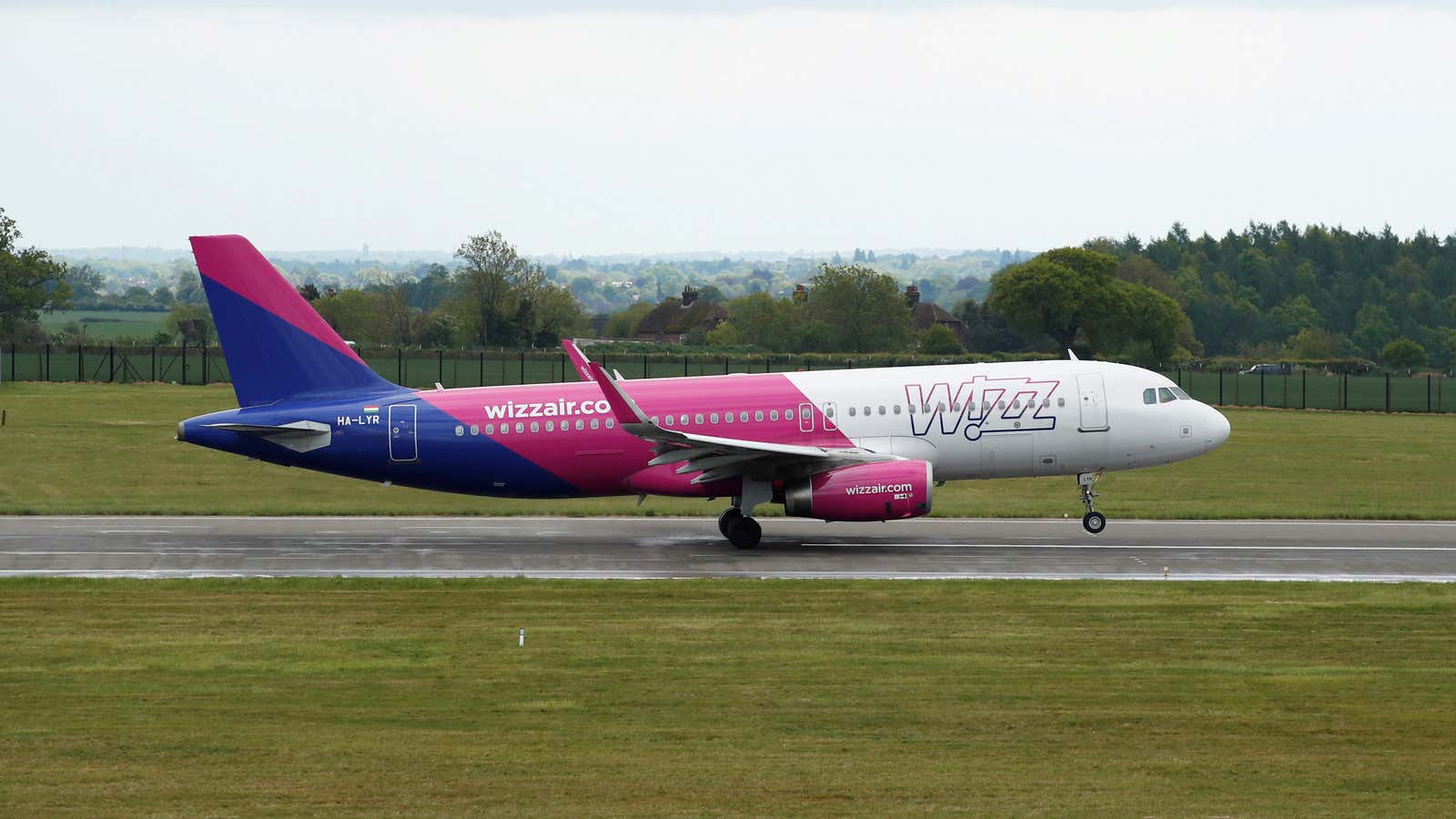As a devastated European airline industry looks to ramp up flights next month, low-cost carrier Wizz Air is soaring higher than the rest.
The Budapest-based company’s stock has gained more than 40% since the middle of March, when the spreading coronavirus pandemic forced most airlines in Europe to sit on the tarmac.
To protect the industry and stave off job losses, government officials have poured billions of dollars of support into major airlines like Germany’s Lufthansa and Franco-Dutch company Air France-KLM. Despite immense aid specifically for the flag carriers, investors appear more optimistic about the prospects for Wizz, whose stock has outperformed other major European airlines this year.
Airlines are hoping to get back to work. A large swath of European countries are poised to reopen for air travel within the Continent by July 1, and tourist hotspots are preparing to invite visitors back. Regulators have set out a framework for aviation to reboot.
The next big step will be the removal of restrictions on international traffic, according to Morgan Stanley analysts led by Carolina Dores. Britain has a 14-day quarantine in place for international travelers that is being challenged in court by British Airways, Ryanair, and easyJet. The quarantine will be reviewed by the UK government on June 29.
As flights ramp up, budget airlines like Wizz, Ryanair, and easyJet have been more adept at managing their cash burn while their aircraft are grounded, which has helped them weather the pandemic disruption. Jarrod Castle, an analyst at UBS, points out that these companies are called “low cost” for a reason.
“It’s got to do with the scale of their operations and relative efficiencies of each carrier,” he said in a phone interview. “They were able to stymie the burn relatively quickly. It is literally every single line item, the way they operate their business.”
Ryanair and Wizz stocks are better bets right now than Air France-KLM and Lufthansa, according to Morgan Stanley. That’s because the flag carriers rely more heavily on business travel and long-haul routes that will likely to be slower to bounce back. They will also have a lot of work to do to repay money they’ve borrowed from taxpayers. (Norwegian Air, a discount carrier for long-haul flights that got a $271 million loan from the Norwegian government, has fallen more than 90% in the stock market this year.)
“They will need profound restructuring to repay government loans,” Morgan Stanley’s analysts wrote.
The extraordinary government support for the German and French flag carriers has been contentious. Air France-KLM, which is part owned by the French and Dutch governments, got a bailout of around $11 billion in loans. Lufthansa received financing of about $10 billion, (almost enough to buy Ryanair, based on its $13 billion market capitalization) that includes the government taking a 20% or more stake in the airline. Italy is expected to nationalize its carrier, Alitalia, which has run years of losses. And in the US, a raft of carriers are being propped up via a $25 billion bailout consisting of grants and loans.
Wizz CEO József Váradi claims the government support will “completely” distort the playing field. “There is a lot being done in favor of the national carrier when it comes to commercial terms, when it comes to putting up administrative barriers for intruder competitors,” he said in an earnings conference call on June 3. “The easy financial aid—whether this is liquidity or capital provided by governments—essentially, that preserves many of the inefficiencies faced by these national carriers.”
A spokesperson for Air France-KLM declined to comment beyond a statement published on May 7 about the terms of the government financing. Lufthansa didn’t respond to a request for comment.
For officials in Frankfurt and elsewhere, the main goal is likely to reduce steep job losses and to prevent whole industries from going into free fall. From an employment standpoint, their efforts may be working, in some instances. Easyjet and British Airways are enduring layoffs of around 30% of the workforce, while Lufthansa has suffered cuts amounting to about 16% and Wizz about 20%.
“What governments are trying to achieve is industry preservation, job preservation,” Castle said. The flag carriers “are going to emerge smaller, but they would have been even smaller if they hadn’t had that aid.”
That isn’t to say the low-cost airlines haven’t received any government help. Wizz, easyJet, and Ryanair have have tapped a program run by the Bank of England for short-term borrowing (commercial paper), for example. The difference, analysts and executives say, is that that aid is available to all companies that meet sufficient credit criteria, instead of singling out a national champion for special support and large equity stakes. UK flag carrier British Airways, part of IAG, hasn’t received specialized financing from the government, but it tapped the same borrowing facility as Wizz and the other budget airlines.
Michael O’Leary, CEO of Ryanair, said he was grateful for any support scheme as long as it’s open to all the carriers. He says he’s concerned that some big competitors will emerge from the crisis with the funds to buy out rivals or offer flights below cost. “We are facing a massively distorted market across Europe, I think, for the next four or five years,” O’Leary said.
In the meantime, a key question is whether airlines receiving heavy government support will prosper in the post-Covid economy. Much remains unknown about how quickly, and to what extent, travelers will go back to their old vacation habits, and the same is true for lucrative business passengers. Epidemiologists and officials are anxiously watching for signs of a second wave of coronavirus infections that could force another round of lockdowns and travel restrictions. There’s a risk that government support for major airlines is postponing an even bigger, inevitable restructuring.
Even as travel begins to take off, more turbulence is likely.
